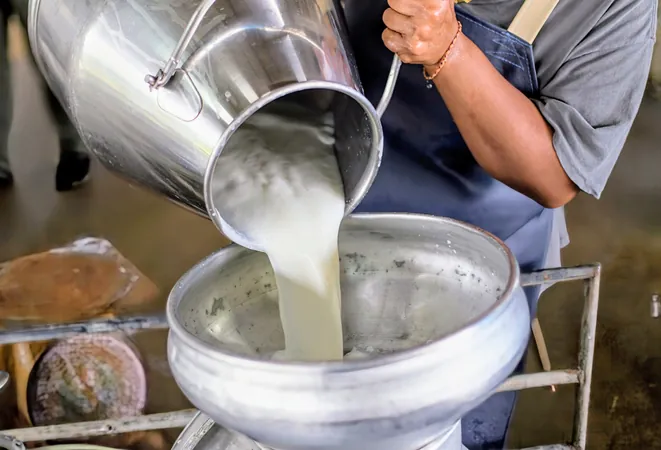
Beware! Raw Milk May Harbor Dangerous Flu Viruses for Days
2024-12-15
Author: Noah
In a shocking turn of events for health-conscious individuals, new research from Stanford University has revealed that raw milk—a product often praised for its natural qualities—could carry the flu virus for up to five days when stored in a refrigerator. This alarming issue arises amidst ongoing bird flu outbreaks in cattle, raising serious concerns about a potential pandemic threat.
Professor Alexandria Boehm, senior author of the study, stated, “This work highlights the potential risk of avian influenza transmission through consumption of raw milk and the importance of milk pasteurization.”
Raw Milk: A Risky Trend Gaining Popularity
Every year, over 14 million Americans choose to drink raw milk, believing it is superior to pasteurized alternatives due to its unprocessed nature, which many argue preserves essential nutrients, enzymes, and probiotics that are beneficial for gut health. However, numerous health agencies, including the FDA, caution against consuming raw milk, linking it to more than 200 illness outbreaks due to harmful pathogens like E. coli and Salmonella. The risks are particularly significant for vulnerable populations such as children, pregnant women, the elderly, and those with compromised immune systems.
Flu Virus Found in Cow’s Milk
The study specifically examined how long the H1N1 influenza virus can remain infectious in unpasteurized cow’s milk under typical refrigeration conditions. Researchers discovered that not only could the virus survive for up to five days in raw milk, but its genetic material—viral RNA—could be detected for as long as 57 days. Although RNA itself poses no immediate danger, its presence complicates efforts to ensure food safety and monitor environmental health.
Co-lead author Mengyang Zhang remarked, “The persistence of infectious influenza virus in raw milk for days raises concerns about potential transmission pathways,” warning that the virus could contaminate surfaces within dairy facilities, posing risks to both animals and humans.
Proactive Measures Needed for Food Safety
With seasonal flu leading to over 40 million infections and more than 50,000 deaths annually in the U.S., the potential for zoonotic transmission—viruses jumping from animals to humans—cannot be ignored. The 2009-2010 swine flu pandemic serves as a stark reminder of how swiftly viruses can spread, as it resulted in up to 1.4 billion infections worldwide.
While bird flu has not yet posed a significant threat to human health, recent cases in cattle underscore the urgent need for enhanced monitoring of pathogens in the dairy sector. The findings from this study call for improved surveillance measures to protect public health, particularly as bird flu spreads among livestock.
Profound advancements have already been made, such as utilizing wastewater analysis for the early detection of zoonotic pathogens in agricultural settings, which offers promise in reducing risk levels.
The Importance of Pasteurization
Ultimately, this research emphasizes the vital role of pasteurization in safeguarding public health. Policymakers and health officials must consider these findings to fortify food safety protocols amidst growing concerns about zoonotic diseases. While raw milk may tempt some with its purported health benefits, science indicates that the dangers far outweigh these rewards. Making informed choices by opting for pasteurized products is crucial for protecting our health and that of our loved ones.
The study, published in *Environmental Science & Technology Letters*, has sparked a vital conversation on food safety practices. As we navigate the complexities of raw milk consumption, awareness and adherence to scientific insights remain our best defenses against potential health crises.
Stay informed—subscribe to our newsletter for the latest updates on health news and more.









 Brasil (PT)
Brasil (PT)
 Canada (EN)
Canada (EN)
 Chile (ES)
Chile (ES)
 España (ES)
España (ES)
 France (FR)
France (FR)
 Hong Kong (EN)
Hong Kong (EN)
 Italia (IT)
Italia (IT)
 日本 (JA)
日本 (JA)
 Magyarország (HU)
Magyarország (HU)
 Norge (NO)
Norge (NO)
 Polska (PL)
Polska (PL)
 Schweiz (DE)
Schweiz (DE)
 Singapore (EN)
Singapore (EN)
 Sverige (SV)
Sverige (SV)
 Suomi (FI)
Suomi (FI)
 Türkiye (TR)
Türkiye (TR)